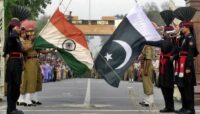On Thursday, Chief Justice of Pakistan (CJP) Umar Ata Bandial asserted that the armed forces would not be allowed to take “unconstitutional steps” while a six-judge bench indefinitely postponed the hearing on a series of petitions challenging trials of civilians in military courts.
The bench, led by CJP Bandial, consisted of Justice Ijazul Ahsan, Justice Munib Akhtar, Justice Yahya Afridi, Justice Sayyed Mazahar Ali Akbar Naqvi, and Justice Ayesha A. Malik.
The previous day, the apex court had rejected a plea by civil society activists, represented by senior counsel Faisal Siddiqi, to constitute a full court for the case.
During the recent hearing, CJP Bandial expressed regret and grief over the events of May 9, emphasizing his desire to avoid any scenario where the army might use force against the people of Pakistan.
He commended the armed forces for their restraint during the violence on May 9, even as civilians attacked army installations in Mianwali. However, he made it clear that the military would not be permitted to take any illegal actions.
Regarding the unavailability of judges, Justice Bandial mentioned that the court still needed to hear the arguments of Attorney General for Pakistan (AGP) Mansoor Usman Awan, which would be delayed for at least two weeks.
Justice Bandial assured Awan that no military trials of civilians would be conducted, to which Awan responded affirmatively and provided assurances on the matter.
CJP Bandial reaffirmed the Supreme Court’s order on providing facilities to suspects in custody, emphasizing the importance of upholding the law and Constitution.
He concluded by stating that the court respected those who cooperated with it, as well as those who did not, underscoring the principle of justice and fairness for all.






